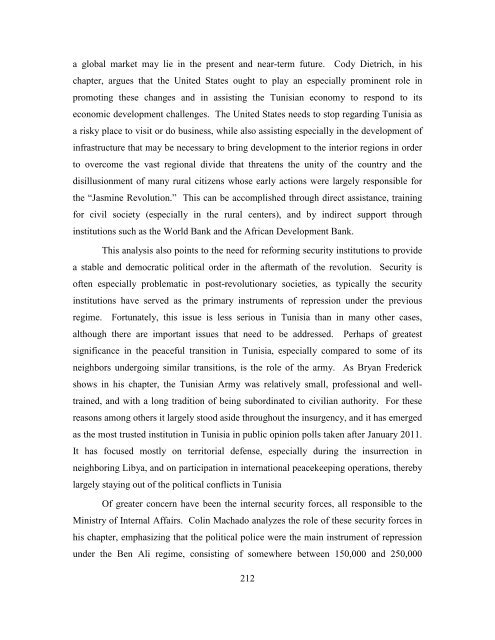Tunisia: Understanding Conflict 2012 - Johns Hopkins School of ...
Tunisia: Understanding Conflict 2012 - Johns Hopkins School of ...
Tunisia: Understanding Conflict 2012 - Johns Hopkins School of ...
Create successful ePaper yourself
Turn your PDF publications into a flip-book with our unique Google optimized e-Paper software.
a global market may lie in the present and near-term future. Cody Dietrich, in his<br />
chapter, argues that the United States ought to play an especially prominent role in<br />
promoting these changes and in assisting the <strong>Tunisia</strong>n economy to respond to its<br />
economic development challenges. The United States needs to stop regarding <strong>Tunisia</strong> as<br />
a risky place to visit or do business, while also assisting especially in the development <strong>of</strong><br />
infrastructure that may be necessary to bring development to the interior regions in order<br />
to overcome the vast regional divide that threatens the unity <strong>of</strong> the country and the<br />
disillusionment <strong>of</strong> many rural citizens whose early actions were largely responsible for<br />
the “Jasmine Revolution.” This can be accomplished through direct assistance, training<br />
for civil society (especially in the rural centers), and by indirect support through<br />
institutions such as the World Bank and the African Development Bank.<br />
This analysis also points to the need for reforming security institutions to provide<br />
a stable and democratic political order in the aftermath <strong>of</strong> the revolution. Security is<br />
<strong>of</strong>ten especially problematic in post-revolutionary societies, as typically the security<br />
institutions have served as the primary instruments <strong>of</strong> repression under the previous<br />
regime. Fortunately, this issue is less serious in <strong>Tunisia</strong> than in many other cases,<br />
although there are important issues that need to be addressed. Perhaps <strong>of</strong> greatest<br />
significance in the peaceful transition in <strong>Tunisia</strong>, especially compared to some <strong>of</strong> its<br />
neighbors undergoing similar transitions, is the role <strong>of</strong> the army. As Bryan Frederick<br />
shows in his chapter, the <strong>Tunisia</strong>n Army was relatively small, pr<strong>of</strong>essional and welltrained,<br />
and with a long tradition <strong>of</strong> being subordinated to civilian authority. For these<br />
reasons among others it largely stood aside throughout the insurgency, and it has emerged<br />
as the most trusted institution in <strong>Tunisia</strong> in public opinion polls taken after January 2011.<br />
It has focused mostly on territorial defense, especially during the insurrection in<br />
neighboring Libya, and on participation in international peacekeeping operations, thereby<br />
largely staying out <strong>of</strong> the political conflicts in <strong>Tunisia</strong><br />
Of greater concern have been the internal security forces, all responsible to the<br />
Ministry <strong>of</strong> Internal Affairs. Colin Machado analyzes the role <strong>of</strong> these security forces in<br />
his chapter, emphasizing that the political police were the main instrument <strong>of</strong> repression<br />
under the Ben Ali regime, consisting <strong>of</strong> somewhere between 150,000 and 250,000<br />
212
















